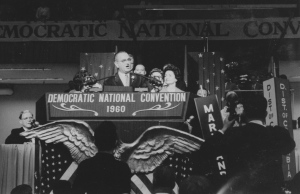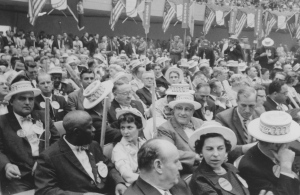I’m reading The Passage of Power, the fourth book of Robert Caro’s multi-volume biography of Lyndon Johnson. The book recreates in vivid detail the years 1958 through 1964, during which Johnson wielded enormous power in the Senate, reached for the Presidency with a baffling strategy guaranteed to fail, became Vice President, and gained the Presidency in a way he never expected.
Oh, and he launched the War on Poverty and the most transformative civil rights policies since emancipation.
The story speaks to me personally
The story speaks to me personally on so many levels.
Johnson’s youth was twisted by poverty. As President, he marshaled the might of the federal government to improve poor people’s lives in a way that was bold at the time and almost inconceivable in the heartless policy environment of recent decades.
How to shift the way people imagine the possible – so that it is the persistence of poverty in America that becomes inconceivable, rather than the hope of ending it – is the driving passion of the Center for Community Change, where I’ve worked for more than 20 years. So it’s fascinating to learn how Johnson found ways to advance so dramatically both civil rights and anti-poverty efforts.
A family connection
I also have a family connection to the book. Both my parents were political activists who volunteered for the Kennedy campaign.
My father attended the 1960 convention that is the highlight of the book’s opening chapters, and took the photos you see here. As a child, I got to accompany my mother to the Kennedy campaign headquarters in Chicago, where I was allowed to stamp the return address on stacks of envelopes.
Not so fast
If you’ve read any of my previous blog posts, you might be thinking, “Well, at least she isn’t talking about her new novel.”
Not so fast.
One element of LBJ’s legacy is, of course, his disastrous leadership of the war in Vietnam. And that war – specifically its lifelong impact on one woman who served – is the focus of my novel, Her Own Vietnam.
See how neatly I have twisted Caro’s award-winning masterpiece so it’s all about me?
You may well wonder what I know about the Vietnam War and its afterlife. More on that later.
Meanwhile, enjoy these photos of the past.




Also, I’m absolutely embarassed, you should know, that I’ve yet to read the Caro books on LBJ even though I’ve owned them for a decade now. Although I do find it worth noting that LBJ made his War on Poverty campaign debut on January 8, my birthday.
Anyone visiting the LBJ Library (I believe the only presidential library that is free to the public, as LBJ decreed it must be) cannot be overwhelmed by the sheer amount of social policy he is responsible for wrangling through Congress. There used to be/may still be a short 8 minute film at the Library that provided background on the War on Poverty and then simply let the number of social programs scroll on screen – basically everything you’ve ever heard of happened on LBJ’s watch. It is awe-inspiring.
LBJ’s last public interview was with Walter Cronkite ten days before his death. It focused entirely on civil rights and the Civil Rights Act of 1964. He was trying to wrest his legacy from Vietnam. Forty years later, it’s still a battle.
LikeLike
*cannot help but be overwhelmed, rather.
LikeLike
Melanie, this is fascinating. Thanks for sharing this. I’ve never been to the LBJ Library or any presidential library.
LikeLike
Lynn,
Your writing always creates a sense of awe for me. Your choice of verbs. Your own wonder at the work of others – whether it is writing or organizing. Your capacity to read and write and work. I am inspired to read the Johnson books, I am amazed again at how close your parents were to the center of American politics, and I am even more looking forward to reading your novel. Thx for the blog.
Love
Susan
LikeLike